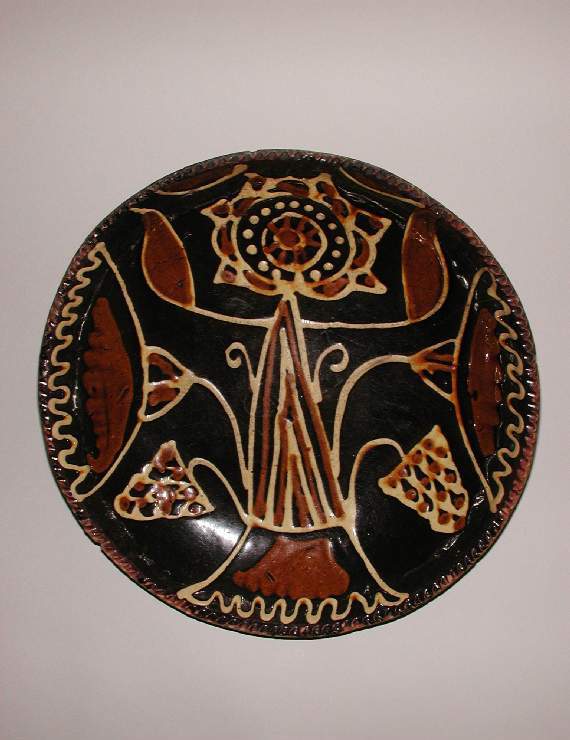Awaiting location update
Maker(s)
Potter:
Unidentified Pottery
(Uncertain)
Entities
Categories
Description
Earthenware dish with crinkled edge, the interior coated in dark brown slip, and slip-trailed in two shades of brown and cream with a symetrical floral floral design, under lead-glaze
Dark buff earthenware, slip-coated on the interior in dark brown, slip-trailed in light brown and white, and lead-glazed. The reverse is undecorated. The dish is circular with deep curved sides and a crinkled edge, produced by impressing a semi-circular tool or stick. The surface is entirely occupied by a triangular stem with a large rosette at the top flanked by leaves, and lower down, curved stems bearing large semi-circular flowers with wavy edges (perhaps tulips), and below them, stems bearing triangular seed heads or leaves.
Notes
History note: Bishops' at Bideford; sent on approval to Cambridge on 22 November 1924, where it arrived on 24 November, and was purchased for £10.10s. by Dr J.W.L. Glaisher, FRS, Trinity College, Cambridge
Legal notes
Dr J. W. L. Glaisher Bequest
Measurements and weight
Diameter: 34.3 cm
Height: 7.2 cm
Acquisition and important dates
Method of acquisition: Bequeathed
(1928-12-07)
by
Glaisher, J. W. L., Dr
Dating
18th Century, first half
Circa
1700
CE
-
1750
CE
Note
When Dr Glaisher bought this dish, he attributed it to Cock Pitt Hill in Derbyshire, but had doubts if that was correct. Bernard Rackham, in his Catalogue of the Glaisher Collection (1935) attributed it to Bolsover in Derbyshire on the grounds of fragments of slipware found there, but this is uncertain. It might have been made in Staffordshire or elsewhere in northern England. A dish of a different shape with a dark brown ground, slip trailed with a plant with a tulip at the top, and on either side at its base, triangular motifs similar to those on this dish, and with the initials SM moulded in relief, has been attributed to Samuel Malkin of Burslem. The plant design seems have been influenced by English delftware floral dishes known as blue dash chargers which have tulips, or roses and other flowers and buds springing from a central point at the lower edge of the dish when upright.
Components of the work
Decoration
composed of
slip
( dark brown, brown and cream)
Surface
composed of
lead-glaze
Front Surface
Front
Materials used in production
dark buff
Earthenware
Techniques used in production
Moulded
: Earthenware, slip-coated in dark red, with slip-trailed decoration in brown and cream, under lead-glaze
Inscription or legends present
Inscription present: rectangular white paper stick on label with upper corners cut and blue-black line round the side and top edges
- Text: 4464/Bowl-shaped/slip ware dish, with/notched edge, decorat/edin red and yellow /slip upon a dark/ground, with a flower/leaves etc./?Cockpit Hill/Came from Bideford/b. Nov 24 1924
- Location: In middle of back
- Method of creation: Hand-written in blue-black ink
- Type: Label
References and bibliographic entries
Identification numbers
Accession number: GL.C.53-1928
Primary reference Number: 77079
Glaisher MS Catalogue: 4464
Stable URI
Audit data
Created: Saturday 6 August 2011
Updated: Friday 27 December 2024
Last processed: Tuesday 15 July 2025
Associated departments & institutions
Owner or interested party:
The Fitzwilliam Museum
Associated department:
Applied Arts




